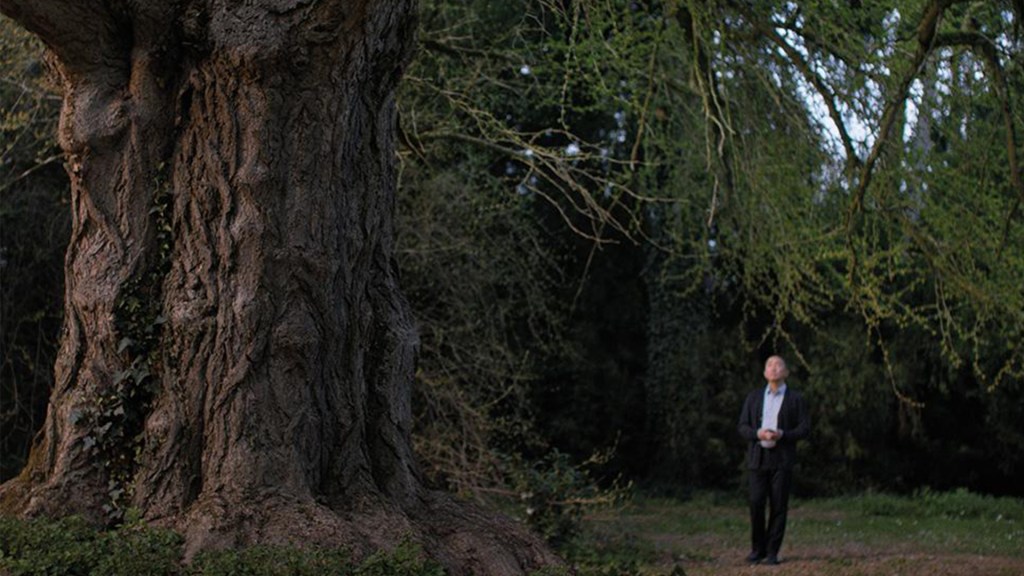Beautiful, elusive and peppered with provocative nuggets about the nature of life and our place in it, Hungarian director Ildikó Enyedi’s Silent Friend is the Venice Film Festival’s parting gift to all those who have lasted the distance. Festival press shorthand has dubbed it “the tree film” — its central motif is a magnificent gingko tree, while its primary setting is the botanical garden surrounding Marburg’s university – but this falls so far short of what it is that it’s a kind of in-joke. This is a film about science, but it is told as poetry.
Gingko trees are either male or female. As a female with no corresponding male to help it bear fruit, this lush queen of the garden is an arboreal metaphor for the film’s human characters, who can talk about trees but not about their own loneliness. The gingko is also the subject of study by a neuroscientist, who wonders if it has the vegetable equivalent of brain waves. Does it register the people around it? The great tree is festooned with receptors and wires. Most of all, however, the gingko tree is a living thing: alive, in fact, as we all are.
Professor Wong (Tony Leung Chiu-wai) is a visiting lecturer at the university, revered but removed from his fellows, whose field of study is pre-verbal infants. For the morose German garden caretaker Anton (Sylvester Groth), his tai chi exercises are proof enough that he is dangerously foreign; it will take the protracted Covid lockdown of 2020, when he and the professor are the only people left on campus, to reconcile him to the strangeness of the newcomer.
Wong’s story is unexpectedly put on pause, however, as we are transported back to the black-and-white world of 1908, where Grete (Luna Wedler) is hoping to be accepted as the first female student in the university’s science faculty. The mood is not hopeful. She is examined for her knowledge of the Linnaean system by a phalanx of aging men who humiliate her by turning every question about plants into a leering inquiry into her presumed dubious morals. There is nothing quite so sluttish, apparently, as a lustful pistil.
Then it is 1972 – shot on 16mm color film that is brilliant but never quite true – where virginal farm boy Hannes (Enzo Brumm) yearns visibly but ineffectually for Gundula (Marlene Burow), his dorm mate. Vital, athletic and carelessly brutal with her new acolyte’s feelings, Gundula is riding an earlier wave of inquiry into plants’ powers of communication, a heady mix of recorded electrical data and contemporary hippie vibes. Her subject is the geranium on her windowsill. Hannes, immersed in Rilke, is gradually persuaded that botany has its own romance. He may not be getting far with Gundula, but he and the geranium definitely have a thing going on.
Enyedi, who won the Golden Bear in Berlin and an Oscar nomination in 2017 with her feature On Body and Soul, weaves these three narratives as if she were re-creating a rope of entwined vines, strong and inseparable. It is a film full of information and theories – like the students, you could take notes – but they all serve to support the central question posed by the film: how does communication happen? Not simply between humans, who fancy themselves the center of the universe, but between any living thing?
This is a film about inquiring minds; what they will do next holds our attention. In between times, there are long shots of the gingko, tree’s-eye views of what is happening on the ground and squelching closeups of germinating seeds – luscious and inescapably sensual. It is only during the roll of final titles, which include credits in Latin for all the plants included, that it hits you: There have been no breakthroughs, no triumphant high-fives as a tree talks back, no comeuppance for those crusty pre-war professors. Within each narrative, nothing is fundamentally resolved. Grete becomes a master of botanical photography, but it is unclear whether the world of men will ever take notice. The geranium and the gingko tree yield data but no conclusive results.
This might feel like cheating. We are used to the story trajectory that passes from problem to resolution; drama is built that way. We sat there for 2½ hours and nothing’s sorted! But this is the inherent nature of the research each of these characters, in their respective eras, is pursuing. Nothing is certain; everything is ongoing. There are small upswings of optimism when a needle registers a sudden response – the geranium enjoys being watered, for example – but they might prove to be mistakes. What endures is curiosity and, at least in this film, a lasting sense of wonder. What a lovely piece of work this is.
Title: Silent FriendFestival: Venice (Competition)Director-screenwriter: Ildikó EnyediCast: Tony Leung Chiu-wai, Luna Wedler, Enzo Brumm, Sylvester Groth, Martin Wuttke, Johannes Hegemann, Rainer Bock, Léa SeydouxSales agent: Films BoutiqueRunning time: 2 hr 25 mins
The post ‘Silent Friend’ Review: A Mesmerizing Reflection On Humans, Plants & How We Might Communicate – Venice Film Festival appeared first on Deadline.




